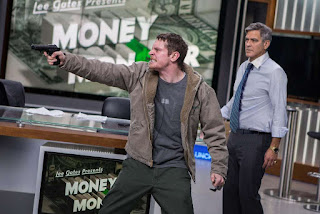Money Monster
I rarely attend opening-night film releases, but the opportunity was there and I decided to take a chance on a film that stars (and is produced by) George Clooney and is directed by Jodie Foster. I had, unfortunately, seen too much of the trailer, which basically covers the entire film (pathetic!), but that added to my hope that Money Monster was a thriller with something to say.
Sigh. My hopes were unjustified.
Clooney plays Lee Gates, an over-the-top host of a daily TV show about investments. Gates tells viewers where they should, and should not, be investing their hard-earned money. Unfortunately for Gates, his last recommendation turned out to be a disaster, with the IBIS investments he told people to buy suddenly tanking in value, supposedly due to a computer glitch.
Kyle Budwell (Jack O’Connell) has lost all his savings ($60,000) and can’t take it anymore. On behalf of all those who lost money (a total of $800m) thanks to Gates, and as a message to the wealthy 1% who rule the world, Kyle brings a bomb and a gun to the TV studio, straps the bomb onto Gates and pushes down the switch in his hand (if he releases it, ka-boom).
Panic ensues, the police rush to the studio, Gates’s producer, Patty Fenn (Julia Roberts), tries to do what she can to keep Gates alive, and Kyle tells everyone on live TV that he’s going to blow up the studio unless someone can tell him the real story behind how IBIS lost $800m in one afternoon, and then apologize. The IBIS CCO (chief communications officer), Diane Lester (Catriona Balfe) also wants to know what really happened and finally tracks down the IBIS CEO, Walt Camby (Dominic West), whose story just doesn’t hold up.
That’s more than enough to say about the plot, which, unfortunately, felt less than credible from the get-go and only got less credible as the film wore on. The questionable premise and denouement might have been forgivable, especially since the acting by all concerned was actually quite good, if not for two factors: 1) Despite trying to be an intense dramatic thriller, there are consistent (and often successful) attempts to make the most horrific scenes humorous. This, of course, is what you want if you are making a dark comedy, but if you are making a thriller about a very serious and sad situation, with a serious message, you have to be very careful about where and how you use humour. In Money Monster, half of those attempts were, for me, inappropriate; 2) The ‘serious message’ in question is nowhere near profound enough to make this otherwise ordinary thriller something special. I had hoped for some kind of anti-capitalist or anti-investment or anti-1% message to come through, but in the end the anti-corruption message that was there felt banal and toothless.
So, for me, Money Monster was a mildly entertaining and well-made little thriller that could have been so much more. I went away quite disappointed. ***. My mug is up, but …


Comments
Post a Comment